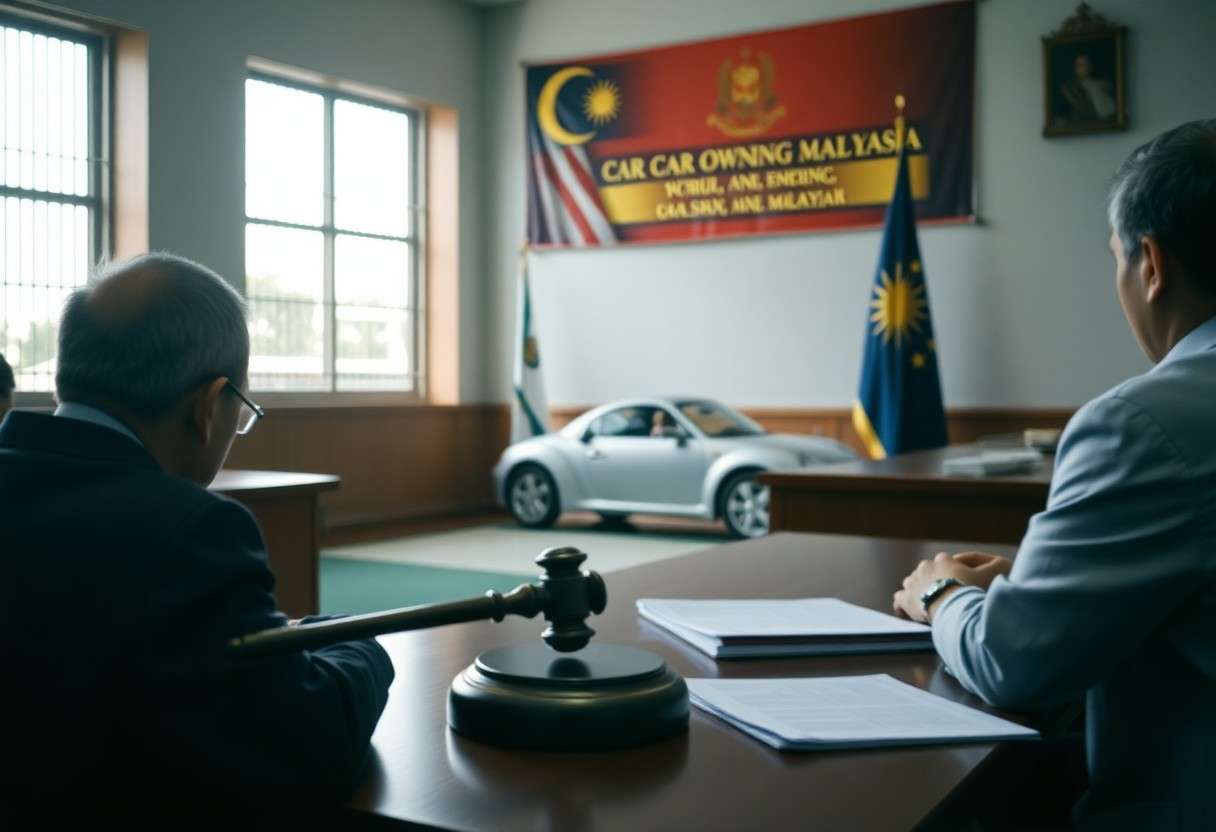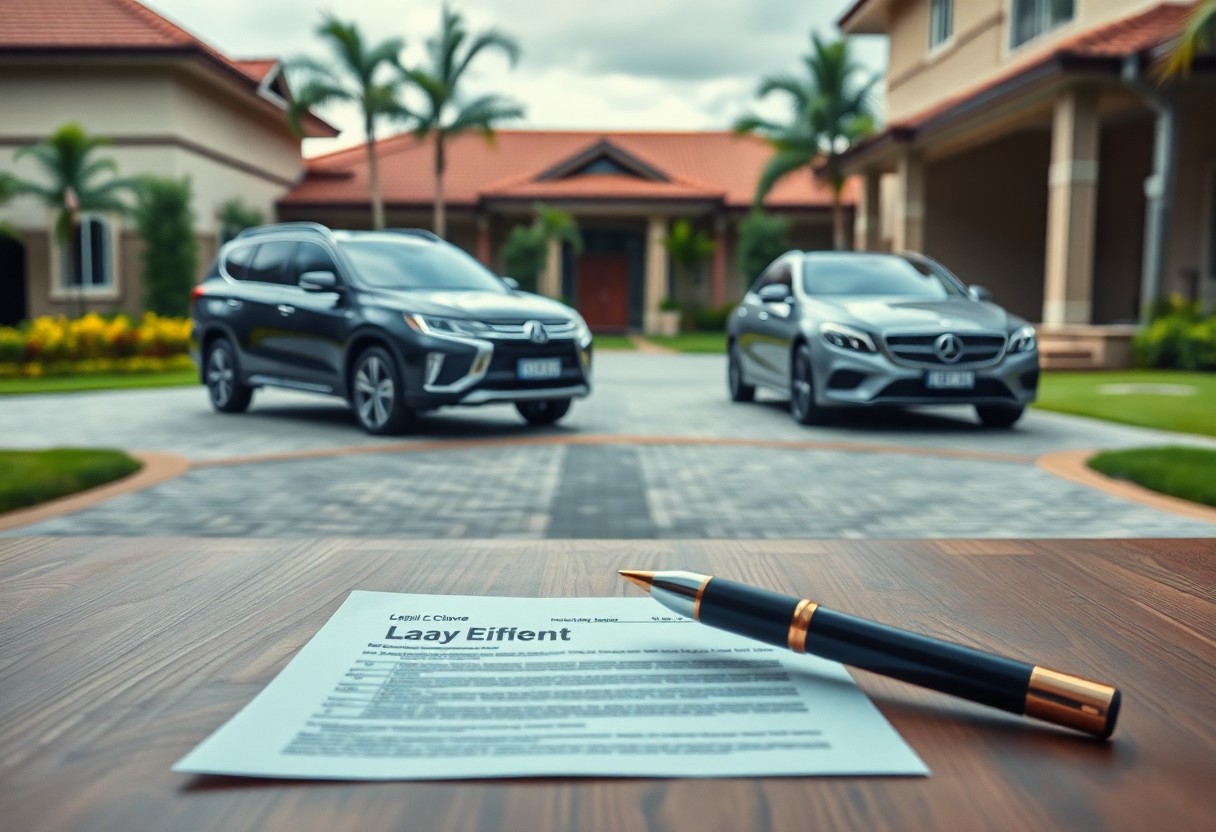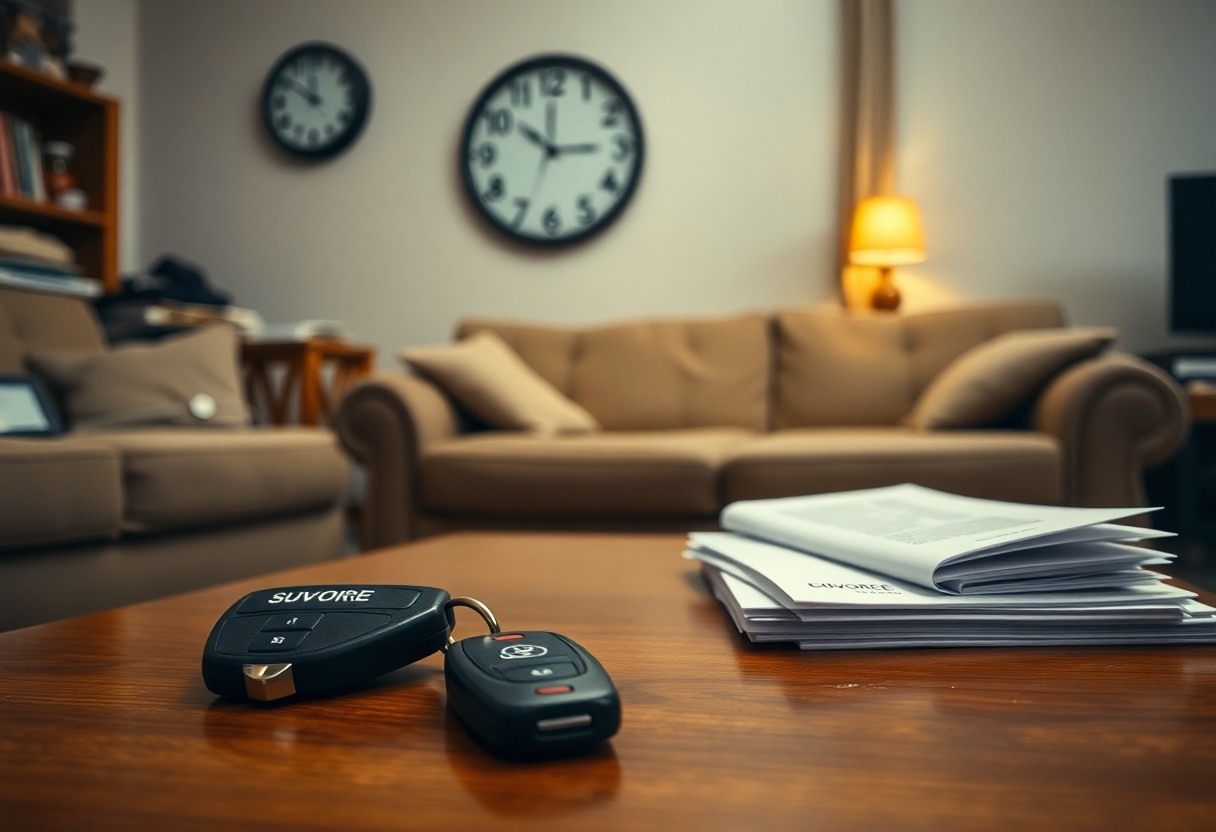Most people going through a divorce in Malaysia face complicated issues regarding car ownership, which can lead to disputes that impact your financial stability and emotional well-being. Understanding the legal framework that governs property division—including vehicles—is crucial to protect your rights. If you and your spouse jointly own a car, determining who gets to keep it can significantly affect your post-divorce life. Staying informed about your rights and the intricacies of Malaysian law can help you navigate these challenges effectively.
Key Takeaways:
- Divorce settlements in Malaysia often involve the division of assets, including vehicles.
- Ownership of a car can be determined by the name on the registration, but other factors may influence decisions.
- The court may consider the financial contributions of each party to the purchase of the vehicle.
- Existing hire purchase agreements can complicate ownership disputes in divorce cases.
- Negotiation and mediation are encouraged to resolve vehicle disputes amicably.
- Legal representation is advisable to navigate the complexities of asset division.
- Involvement of third-party claimants, like banks, can affect the final decision regarding car ownership.

Navigating Legal Frameworks for Car Ownership in Divorce
In Malaysia, navigating the legal aspects of car ownership during divorce entails understanding various laws and regulations, particularly the Malaysian Family Law. The distribution of assets, including vehicles, often hinges on the specifics of your marriage contract and the nature of the property, whether it’s joint or separate. Courts typically consider the financial contributions and the children’s welfare when determining ownership, so it’s vital to present clear evidence supporting your claims.
The Role of Malaysian Family Law
Malaysian Family Law governs the division of property in divorce proceedings. Under the Law Reform (Marriage and Divorce) Act 1976, assets acquired during the marriage, including vehicles, are subject to equitable distribution. Courts assess factors like each spouse’s financial contributions, the duration of the marriage, and welfare of dependents, ensuring a fair division of property that reflects both parties’ contributions.
Ownership vs. Possession: Understanding Property Titles
Understanding the distinction between ownership and possession is vital in divorce disputes. Ownership refers to the legal title of the vehicle, which may not always align with who has physical possession. For example, if the car is in your spouse’s name but you’ve been the primary driver and financially supported its purchase, this complicates claims. Courts look at both legal documents and the context of use to ascertain rightful ownership.
In divorce cases, possessing the vehicle can provide a significant advantage, especially if you have been using it exclusively. Ownership is typically evidenced by registration documents, which might list one spouse or both. If the car was financed during the marriage, the lender’s title remains a consideration as well. Courts tend to favor equitable sharing when both parties contributed to the car’s purchase, even if one party’s name is on the documents. Citing case studies or past judgments can strengthen your position; for example, a case where the court awarded a vehicle based on the financial support demonstrated by one spouse can serve as a precedent for your argument. Understanding these nuances can empower you in negotiations or court proceedings related to vehicle ownership.
Assessing Financial Implications of Vehicle Division
Dividing vehicles during a divorce involves significant financial consequences. Understanding the current market value of the car, any outstanding loans, and the insurance implications is important. You must address ownership concerns, as vehicles often represent substantial assets that can impact overall financial settlements and support obligations. Proper valuation can help you achieve a fair division of assets, allowing both parties to move forward without lingering disputes.
Valuation Methods for Division of Assets
Utilizing reliable valuation methods is vital to ensure an equitable division of vehicles during a divorce. You might consider professional appraisals, which assess the vehicle’s fair market value and factor in depreciation, condition, and mileage. Alternatively, online resources and auto guides can provide estimates, but they might lack accuracy compared to a formal assessment. Having a clear understanding of your vehicle’s worth aids in negotiating a balanced settlement.
Impact of Car Loans and Financing on Divorce Settlements
Outstanding car loans significantly influence divorce settlements. If you or your spouse have financed the vehicle, the remaining balance is typically included in asset evaluations. You may need to negotiate who assumes the debt and determine how that affects the overall division of assets. Failure to account for this debt can result in future financial strain, as the responsible party may inadvertently shoulder undue financial burden.
The presence of car loans complicates financial outcomes in divorce settlements. If you have an outstanding loan, both the vehicle and the debt must be addressed. For instance, if only you name the vehicle but both parties share the loan, resolving this inconsistency can lead to further litigation. You should also verify who retains ownership so that payments can be managed post-divorce, preventing credit issues or collection actions down the line. Establishing clear terms regarding responsibilities toward the vehicle and its financing ensures that both parties can transition smoothly into their new financial realities.
Emotional and Psychological Factors in Vehicle Disputes
Vehicle disputes in divorce are often intertwined with emotional and psychological factors. As both parties navigate the division of assets, the attachment to vehicles can elevate tensions and complicate negotiations. You may find yourself struggling with loss and resentment, making it difficult to focus on practical solutions. Emotional ties to the car, linked to shared memories or identity, can overshadow financial considerations. These feelings can prolong disputes, affecting overall well-being.
- Emotional attachment can complicate negotiations.
- Psychological factors may influence disputes.
- Strong feelings can lead to prolonged conflicts.
Sentimental Attachment: The Psychological Cost of Car Division
Sentimental attachment to vehicles often signifies deeper psychological impacts, particularly if the vehicle represents a shared journey or milestones in your relationship. The process of division may evoke feelings of loss or betrayal, making it necessary to acknowledge these emotions. You might grapple with nostalgia, as memories tied to the vehicle surface, leading to emotional turmoil during an already challenging time.
Mediation vs. Litigation: Emotional Outcomes
Mediation and litigation yield vastly different emotional outcomes in vehicle disputes. With mediation, the focus is on collaboration, fostering a supportive environment that can mitigate negative feelings. In contrast, litigation often heightens tensions, causing adversarial emotions to flourish. You might find that mediation allows for emotional healing and mutual respect, while litigation can lead to prolonged stress and resentment.
Mediation can enhance emotional well-being, promoting understanding and cooperation between parties, which is particularly beneficial in resolving car ownership disputes. This collaborative approach encourages open dialogue and facilitates a more amicable split, allowing you to express your feelings about the vehicle’s significance. In contrast, litigation often exacerbates conflict and emotional strain, leading to a combative atmosphere. Assume that investing in mediation can lead to less emotional distress, fostering better post-divorce relationships and support systems, especially crucial if children are involved. The emotional relief from a smoother negotiation process can make a significant difference in your overall well-being.

Strategies for Resolving Car Ownership Disputes
Resolving car ownership disputes post-divorce often requires a structured approach. Start by clearly defining ownership and usage terms of the vehicle in question. Open discussions can reveal interests and priorities, enabling compromises that align with both parties’ needs. Engaging a mediator may also facilitate smoother negotiations, ensuring that emotions do not overshadow practical considerations. Documenting agreements can safeguard your interests and prevent future misunderstandings.
Effective Communication During Negotiations
Effective communication is key to navigating car ownership disputes. Approach discussions with a calm and respectful demeanor, focusing on finding common ground rather than assigning blame. Use active listening techniques to truly understand your ex-spouse’s concerns and needs. Articulate your position clearly and maintain an open dialogue, which can lead to more amicable resolutions and minimize conflict.
Legal Resources and Support for Affected Individuals
Access to legal resources and support can significantly impact the outcome of car ownership disputes. Many organizations offer legal aid services tailored for individuals facing divorce-related issues. Engaging with family law professionals can provide you with crucial insights on your rights and options, ensuring informed decisions are made throughout the process.
Consider consulting organizations such as the Malaysian Bar Council, which provides resources and can connect you with qualified lawyers specializing in family law. Utilizing mediation services may also be beneficial, allowing for a structured environment to negotiate ownership terms. Additionally, community support groups can offer emotional guidance and shared experiences, making the process feel less isolating. Always prioritize working with professionals who understand the intricacies within Malaysian law to effectively advocate for your rights related to car ownership disputes.

The Impact of Technology on Vehicle Ownership Disputes
Technology has transformed the dynamics of vehicle ownership disputes, particularly in a divorce context. Data from vehicle tracking systems, ownership records in digital format, and shared mobility apps can provide definitive proof of ownership and usage patterns. Aspects such as app-controlled vehicle access and ride-sharing services complicate traditional ownership models, forcing you to navigate new terrains in asset division.
The Rise of Shared Mobility and Its Implications
Shared mobility is gaining traction in Malaysia, influencing how vehicles are perceived during divorce proceedings. With ride-hailing services and car-sharing platforms, you may rely less on personal vehicle ownership, complicating claims of entitlement. Shared access blurs the lines of ownership, making it vital to discuss how these trends affect your vehicle asset division strategy.
Digital Evidence: Ensuring Fair Settlements in a Tech-Driven Era
Leveraging digital evidence can significantly improve the fairness of settlements in vehicle ownership disputes. Access to digital records, GPS data, and transaction histories equips you with concrete proof to substantiate claims regarding vehicle usage and ownership, ensuring unbiased evaluations in negotiations.
For instance, utilizing data gleaned from vehicle tracking apps or ride-hailing services can identify the primary user and regular usage patterns, thereby establishing ownership rights more efficiently. Courts increasingly acknowledge this digital evidence, paving the way for more equitable settlements based on factual, indisputable information. By documenting every aspect of vehicle usage, you can solidify your case in negotiations, minimizing emotional disputes and focusing on objective data to reach an amicable agreement.
Conclusion
Taking this into account, understanding the complexities of divorce and car ownership disputes in Malaysia is imperative for you as a party involved. Being informed about property rights, legal implications, and the importance of documentation can significantly impact your case. You should consider seeking legal advice to navigate these challenges effectively and ensure your interests are protected during the division of assets.
FAQ
Q: What happens to joint cars during a divorce in Malaysia?
A: Joint cars will typically be divided as part of the asset distribution process in a divorce. The court may order the sale of the vehicle and split the proceeds or assign ownership to one party based on various factors.
Q: How is car ownership determined if only one spouse’s name is on the title?
A: If a car is under one spouse’s name, the court may still consider the contributions made by both spouses toward its purchase and maintenance. This can influence the decision on ownership during the divorce proceedings.
Q: Can a spouse claim a share of a car purchased using personal funds?
A: Yes, a spouse may claim a share of a car purchased with personal funds if they can demonstrate that both parties contributed to the vehicle’s upkeep or that it was acquired during the marriage.
Q: What legal steps should be taken to resolve car ownership disputes during a divorce?
A: It is advisable to seek legal counsel to negotiate a fair division of assets, including the car. If an agreement cannot be reached, a court may need to decide based on the evidence presented.
Q: How does the type of car (loaned, leased, owned outright) affect ownership disputes?
A: Cars that are leased or under loan may complicate disputes as both liabilities and ownership claims need to be addressed. Courts will consider the financial responsibilities and contributions when making determinations.
Q: Is it necessary to get a court order regarding car ownership in a divorce?
A: While not always necessary, obtaining a court order can provide legal clarity and enforceability regarding who owns the vehicle post-divorce, especially if disputes arise.
Q: How can mediation help in resolving car ownership disputes in a divorce?
A: Mediation allows both parties to discuss and negotiate ownership of the car in a less adversarial setting. This can lead to mutually acceptable solutions without the need for a lengthy court process.
